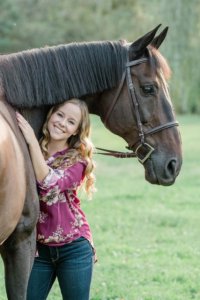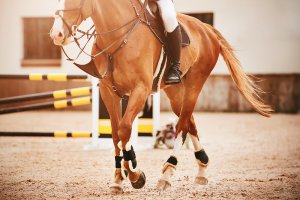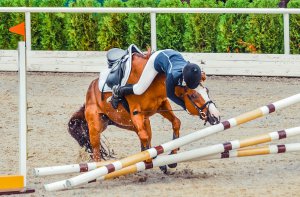Have you Ever Thought About the Way We Describe our Horses?
“5-year-old, 15hh quarter horse gelding, easy keeper, stands for farrier, loads onto the trailer, level headed, and green.” While we use minimal descriptors for our horses, they are truly so much more than that. We know their every quirk, what sets them apart from the rest, what we really need to work on. If you had to describe yourself as an equestrian, how would you categorize yourself?
Maybe “34 years old, 5’5”, not a very good rider, poor seat, severe anxiety with any jump over 2’, has fallen off her horse 3 times this past year” We have a lot of patience for our horses, but we often don’t have much patience with ourselves.
Experiencing Horse Riding Accidents
You love riding horses. It’s your passion. But, part of being an equestrian is accepting that sometimes you will fall. Many riders experience some kind of horse riding accident at some point. In fact, falls can range in severity and can cause serious physical injury. You may manage to escape your fall with little to no physical injury. But, you’re still shaken and scared. This is what we refer to as equestrian-related trauma.
What is Equestrian-Related Trauma?
Equestrian trauma is not a diagnostic term, but it is a very real thing. Trauma is an emotional response to a very distressing or life-threatening event. Although many equestrians don’t identify a fall as being a traumatic experience, it is. When you fall from your horse, your body processes the event and the associated thoughts and feelings in the same way it would process a car accident, or a physical assault. Ultimately when you fall, you’re left fearing for your physical safety.
After a fall, even if you did not experience physical injury, you may still experience trauma symptoms. These vary from person to person but they may include:
- Loss of interest in riding
- Loss of interest in caring for your horse or horses
- Withdrawl from your barn friends or other equestrians
- Panic and nervousness when you’re exposed to horses or when you ride
- Nightmares and/or flashbacks
- Hypervigilance around the stables or while riding
- Body tension
- Irritability
… and more.
Furthermore, these symptoms are not unique to the rider that fell. They can be experienced by someone who witnessed or learned about another equestrian’s fall. This is referred to as secondary or vicarious trauma. People who experience this often experience many of the trauma reactions listed above.
Lisa Weiss, LCSW joined Caroline Culbertson on Noelle Floyd’s Equestrian Voices Podcast to talk about Understanding Trauma + Therapy Through A Rider’s Experience.
The Aftermath of Equestrian-Related Trauma
Traumatic events can make your life very challenging and leave you feeling very frustrated. Trauma reactions can also keep you from enjoying the sport and the horse you love so much. This happens because the memory of the trauma can get stuck in the emotional side of your brain and that keeps it from being fully processed. When you can’t process your trauma you may find yourself unable to make decisions in a rational and thoughtful way. This can negatively impact your life for a long time until it’s addressed and worked through.
Perhaps, your trainers and other riders have told you that “falls happen.” “It’s part of the sport.” “Get back on the horse.” But, it’s just not that easy. What you’re experiencing is a normal response to the trauma you’ve experienced. You’re not weak or inexperienced if you struggle to move on from riding accidents. It’s okay to ask for help when you’re struggling.
You don’t have to live with the negative effects of trauma forever. Equestrian-related trauma therapy can help. A therapist who understands your lifestyle and evidence-based trauma therapy can help you.
Our Approach To Equestrian-Related Trauma Therapy in Branchburg and Scotch Plains, NJ
At Brave Minds Psychological Services, we specialize in helping equestrians overcome the trauma of a fall. Lisa is both an experienced therapist and an equestrian, so she understands what you’re going through and she can help you begin your healing journey. Lisa uses a variety of therapeutic techniques to help you recover from trauma in a healthy way.
One of the primary things you will address in equestrian trauma therapy is the hyperarousal you’re likely dealing with. Hyperarousal is always being on guard against potential danger. This can play out in a variety of ways as an equestrian including not wanting to get back on your horse because you’re worried you’ll fall, making rash or poorly throughout decisions while you’re riding because you inaccurately sense danger, and more.
Addressing Trauma Symptoms in a Safe Space

Together with your trauma therapist, you will learn a variety of techniques to help you cope with distress and feeling unsafe. One way we do this is by teaching you breathing techniques. Another way we help you cope with distress includes guiding you through mindfulness practices. Mindfulness is the practice of focusing your attention on the present moment. Learning to be mindful of the thoughts, feelings, and bodily sensations can help address them piece by piece to promote healing.
Our trauma therapists are skilled and trained in using Trauma-Focused Cognitive Behavioral Therapy (TF-CBT) and Eye Movement Desensitization Reprocessing (EMDR). These are both evidence-based types of trauma treatment that have been proven to be very successful at treating various kinds of trauma. Furthermore, we are dedicated to culturally responsive and LGBTQIA+ affirming services.
EMDR For Equestrian Related-Trauma Therapy
As we mentioned, riders who do not address their accident and subsequent trauma reactions may be susceptible to becoming triggered by things that remind them of the event. This can be incredibly painful. EMDR uses bilateral stimulation (activating both sides of the brain) to help you access the traumatic memory that has become stuck in your mind and move it from the emotional to the logical side of your brain. This allows the brain to process the memory. It also lets you address any negative feelings you may have about the trauma so you can eventually replace them with more positive and productive thoughts. EMDR will not get rid of the trauma memory, but it will lessen the emotional charge associated with them.
Begin Equestrian-Related Trauma Therapy in Branchburg and Scotch Plains, NJ or Online Trauma Therapy in New Jersey
The accident you experienced as a rider does not have to define you. Counseling can help you process the trauma you’ve experienced so you can get back to practicing the sport you love. Our therapists are available to help you begin healing from the trauma you’ve experienced at our Scotch Plains and Branchburg counseling office. Or if you prefer, we can meet with you for online therapy in New Jersey. To get started, follow these steps:
- Connect with us at Brave Minds Psychological Services.
- Meet with one of our caring Equestrian therapists during a free consultation.
- Start your therapy journey today!
Read More Equestrian-Related Mental Health Blogs:
- Equestrian Trauma: Understanding the Anxiety After a Horse-Related Injury
- Equestrian Trauma Part 2: Mental and Emotional Healing
- Being a Body-Positive Parent in Equestrian Sports
- Saddling Up Again: Understanding Your Riding Anxiety
Other Services Offered at Brave Minds Psychological Services
Equestrian-related trauma therapy is not the only service we offer from our Branchburg and Scotch Plains, NJ-based therapy practice. Other services offered at Brave Minds include online therapy, anxiety treatment for children, child sexual abuse therapy, therapy for teens, anxiety treatment for teens, teen social phobia therapy, adult anxiety counseling, couples counseling, counseling for parents, postpartum counseling, birth trauma therapy, sexual assault counseling for adults, food allergy therapy, and group therapy. For more information, feel free to visit our blog. Proud to serve Somerville, Bridgewater, Raritan, Readington and surrounding areas as well as Fanwood, Westfield, Cranford, New Providence and surrounding areas.



